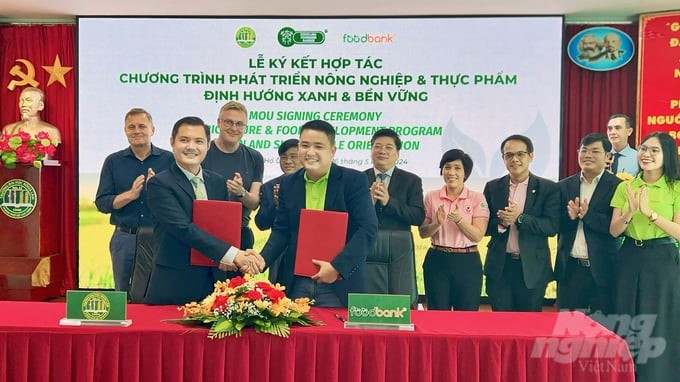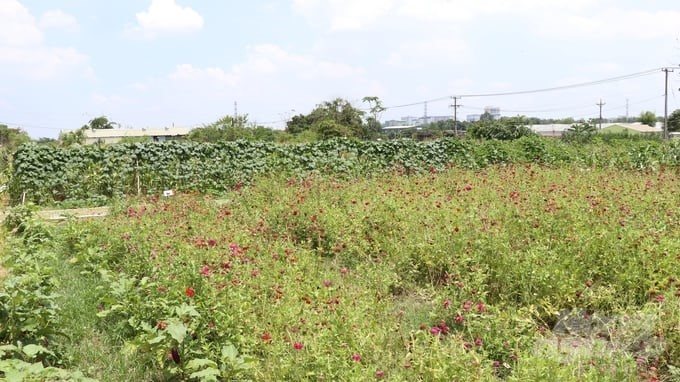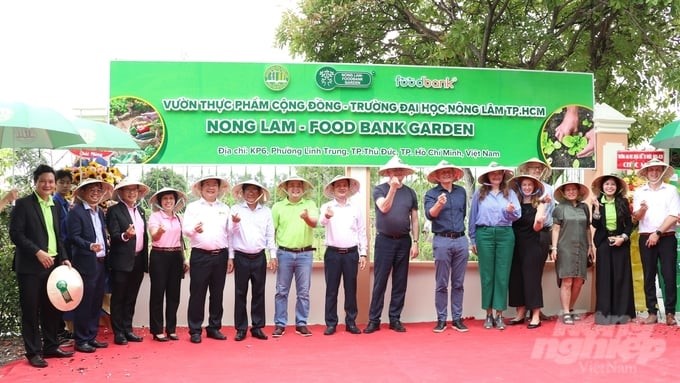May 20, 2025 | 21:53 GMT +7
May 20, 2025 | 21:53 GMT +7
Hotline: 0913.378.918
May 20, 2025 | 21:53 GMT +7
Hotline: 0913.378.918

Assoc. Prof. Dr. Nguyen Tat Toan, Principal of Ho Chi Minh City University of Agriculture and Forestry (left), and Mr. Nguyen Tuan Khoi, Chairman of Food Bank Vietnam (right), shake hands at the signing ceremony. Photo: Tran Phi.
On May 16, in Ho Chi Minh City, Food Bank Vietnam coordinated with Ho Chi Minh City University of Agriculture and Forestry to sign a cooperation agreement on the "Agriculture and Food Development Program with Green and Sustainable Orientation" and inaugurate the Community Food Garden model at Ho Chi Minh City University of Agriculture and Forestry (Nong Lam - Food Bank Garden).
Accordingly, Nong Lam - Food Bank Garden is a non-profit project where everyone joins hands to grow, care for, share, and provide safe food to those in need. This model supports and provides processes of production, organic waste treatment, care, harvest, and finally transportation to the needed place in a public and transparent manner towards a clean and nutritious food source for users, access to high-quality food sources, and reducing the risk of exposure to toxic chemicals. At the same time, the model helps improve air quality and especially contributes to reducing more than 30 million kg of CO2 emissions.
Speaking at the program, Assoc. Prof. Dr. Nguyen Tat Toan, Principal of Ho Chi Minh City University of Agriculture and Forestry, shared that the cooperation with Food Bank Vietnam to implement the model not only contributes to improving the quality of life but also demonstrates the spirit of social responsibility of the school and other school blocks in the area in particular and in the country in general.
The program introduces farming models and focuses on promoting the cultivation of a variety of agricultural crops to increase nutritional diversity and store enough food to deliver to places in need in case of emergency. In addition, the farming models use resources such as water, land, and the available energy resources of the school as an ecosystem to reduce waste and protect the environment. Along with that, the program also focuses on implementing training and experience classes to help students and subjects transform from traditional agriculture to sustainable organic agriculture.

Farming models focus on promoting the transformation from traditional agriculture to sustainable organic agriculture. Photo: Tran Phi.
"The program aims to create linkages and develop short supply and transportation systems between the Food Garden and users to reduce transportation costs and maintain the value of the products made. At the same time, promote cooperation between relevant parties such as students, farmers, businesses, agencies, departments, and branches to create an environment for sustainable food development in the coming time," Assoc. Prof. Dr. Nguyen Tat Toan emphasized.
Sharing at the program, Mr. Nguyen Tuan Khoi, Chairman of Food Bank Vietnam, said that Food Bank Vietnam has deployed Community Food Garden models and developed them over the years towards sustainable development and food balance in Vietnam.
When deployed, the model applied scientific methods to organic agriculture, helping reduce the use of toxic chemicals. Collaborate with chains of large coffee shops in the Ho Chi Minh City area to collect tea dregs, coffee grounds, and organic foods to bring more nutrition to crops, livestock, etc.
"The Community Food Garden model is one of the outstanding activities and models of green transformation in the world and in Vietnam. We founded and developed this model in the direction of green and sustainable development and transformation in the food system," said Mr. Khoi.

The Community Food Garden model is one of the outstanding activities and models of green transformation in the world and in Vietnam. Photo: Tran Phi.
Vietnam is having many opportunities to develop the Community Food Garden model, especially in the context that people and students' majors in the current era are increasingly interested in clean and safe food.
The project will contribute to increasing awareness of the benefits of clean and safe food in the community, thereby creating momentum for all generations to care about and support the Community Food Garden model in the coming time.
Translated by Thu Huyen

(VAN) Japan's grant aid project contributes to capacity building, promoting organic agricultural production, and fostering sustainable community development in Dong Thap province.

(VAN) For years, the CRISPR-Cas9 genome technology has been reshaping genetic engineering, a precision tool to transform everything from agriculture to medicine.

(VAN) Vietnam aims to become a 'leader' in the region in the capacity and managing effectively soil health and crop nutrition.
![Reducing emissions from rice fields: [Part 1] Farming clean rice together](https://t.ex-cdn.com/nongnghiepmoitruong.vn/608w/files/news/2025/05/05/z6509661417740_a647202949c539012a959e841c03e1d3-nongnghiep-143611.jpg)
(VAN) Growing clean rice helps reduce environmental pollution while increasing income, allowing farmers to feel secure in production and remain committed to their fields for the long term.
/2025/05/19/5136-1-144800_230.jpg)
(VAN) The Nghe An Provincial People's Committee has just approved the list of beneficiaries eligible for revenue from the Emission Reductions Payment Agreement (ERPA) in the North Central region for the year 2025.

(VAN) 14 out of 35 domesticated elephants in Dak Lak province have had their living conditions improved, with 11 of them currently participating in the non-riding elephant tourism model.

(VAN) Muong Nhe Nature Reserve hopes that being upgraded to a national park will lay the foundation for forest protection efforts to be carried out in a systematic, modern, and sustainable manner.